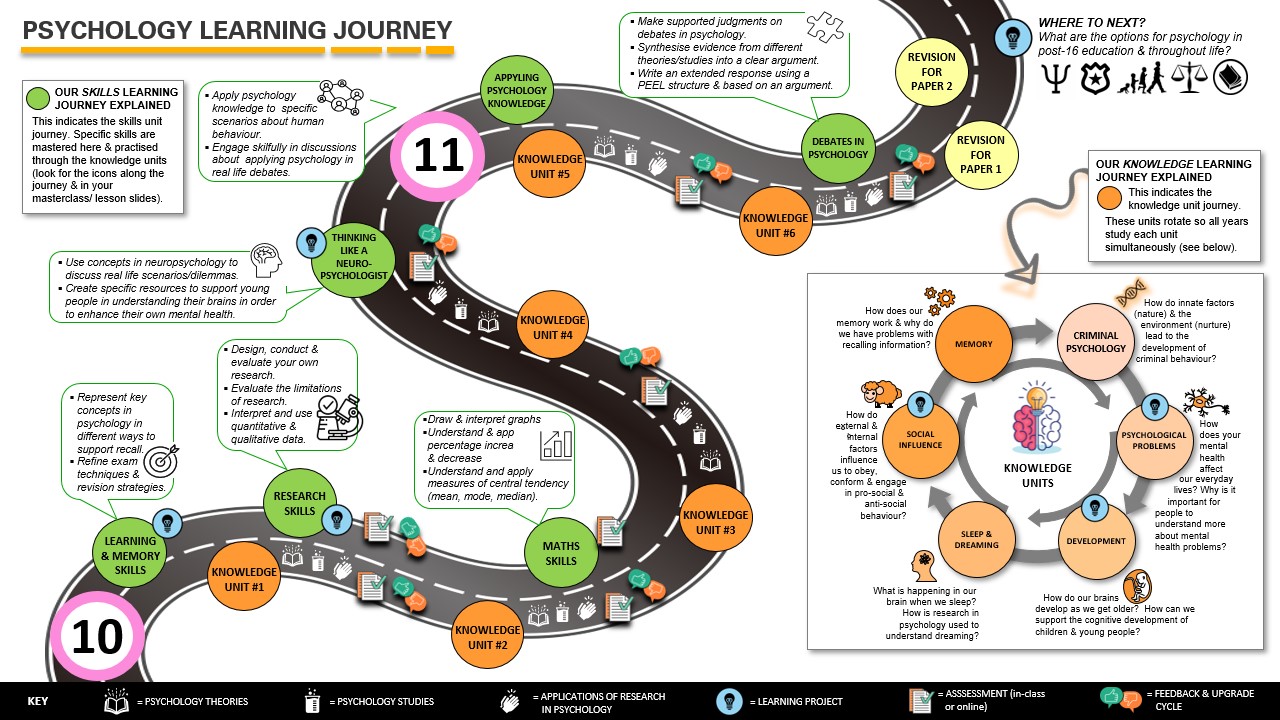Psychology
The study of Psychology shines a light on our own behaviour and the behaviour of others. It brings about empathy, tolerance and an appreciation of how interconnected and complex our lives have become.
Psychology is the study of the human brain and it influences how we behave and interact with others. The relevance of psychology in every person's life provides us with opportunities within the GSCE subject to contextualise psychological theory and research through the discussion of everyday behaviours and events, developing students’ understanding of the real-world applications of the subject. We aim to offer students an engaging, stimulating, and challenging introduction to psychology by fostering their interest in the subject and developing their psychological knowledge and literacy, allowing them to fully understand and confidently discuss psychological issues.
Students will study the following knowledge units and engage with the following inquiry questions: criminal behaviour (why do we commit crime and how can we reduce criminal behaviour and reoffending?); development (does everyone's brain develop in the same way, and how does this influence our development into adulthood?); memory (how does memory work, and how does this influence how we understand our world?); social influence (why do people obey or conform in different contexts?); sleep and dreaming (why do we sleep, and what is happening in our brain when we dream?); and psychological problems (what is mental health and how do illnesses such as schizophrenia or depression impact the individual and their place in society?). In addition to this, students will develop skills in planning, conducting and evaluating research in psychology, and applying knowledge of neuropsychology to a variety of contexts.
Ultimately, our aim is to continuously promote the development of students’ transferable skills in communication, analysis, and evaluation, as well as their ability to apply their knowledge of psychology research studies and theories to a range of social and cultural contexts. The psychology specification builds on knowledge and skills acquired in Maths, Science and Humanities during KS3, and links strongly with other subjects such as Child Development, Citizenship and Sociology.
*****
A successful KS4 Psychology student will be able to draw upon the knowledge and skills they have developed to think like a psychologist in responding to scenarios about the human brain and human behaviour. They will be curious and confidently ask questions, and consequently, they will be able to plan, conduct and evaluate research into the key phenomena in their field. They will be able to use a range a statistical and data analysis skills, including drawing accurate graphs, calculating measures of central tendency, and drawing conclusions from data. Students will be able to engage skilfully in debates by drawing upon all relevant research and theories to synthesis evidence and make well-balanced judgments. They will have developed independent and critical thought, resilience and problem-solving skills, preparing them not only for exam success, but success beyond further education and into the workplace and their everyday lives.
Please click this hyperlink to find out anything you might need to know about the course.
https://passmorespsychology.weebly.com/

